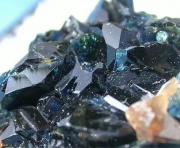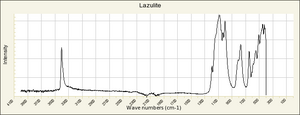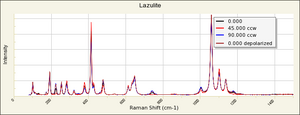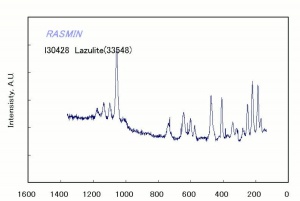Lazulite
Description
A minor blue-green color gemstone composed of iron aluminum phosphate. Although its name has caused some confusion, it has no connection with Lazurite, the main ingredient in Lapis lazuli. Lazulite is a translucent stone that has been found in Switzerland (Zermatt), Austria, Sweden, Malagasy Republic, Brazil (Minas Gerais), Canada (Yukon), and the U.S.(California, Georgia). It was used for inlays on an amulet from the Oxxus Treasure (Ogden 1982).
Synonyms and Related Terms
Lazulit (Deut.)
Physical and Chemical Properties
- Monoclinic system with bipyramidal crystals or grains
- Cleavage = poor to good in one direction
- Fracture = uneven, splintery
- Luster = vitreous to dull
- Streak = white
- Fluorescence = inert
- Pleochroism = strong; dark violet blue and colorless to light blue
| Composition | MgAl2(OH)2(PO4)2 |
|---|---|
| Mohs Hardness | 5.5 - 6.0 |
| Density | 3.0-3.4 g/ml |
| Refractive Index | 1.60; 1.63; 1.64 |
| Birefringence | 0.031 - 0.037 |
Comparisons
Properties of Common Gemstones
Resources and Citations
- Gem Identification Lab Manual, Gemological Institute of America, 2016.
- Mineralogy Database: Lazulite
- Thomas Gregory, The Condensed Chemical Dictionary, Reinhold Publishing, New York, 3rd ed., 1942
- Jack Odgen, Jewellery of the Ancient World, Rizzoli International Publications Inc., New York City, 1982
- Encyclopedia Britannica, http://www.britannica.com Comment: "lazulite." Accessed 7 Apr. 2005 .
- C.W.Chesterman, K.E.Lowe, Audubon Society Field Guide to North American Rocks and Minerals, Alfred A. Knopf, New York, 1979
- Wikipedia: Lazulite (Accessed Sept. 7, 2005 and Dec 2022)



